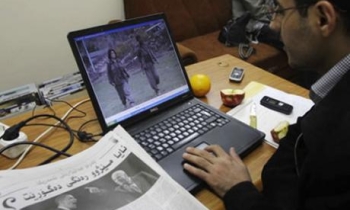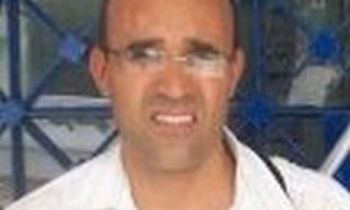Following the US air strikes in Pakistan's Bajaur Agency on January 13 that killed 18 people, mostly women and children, the local administration has stopped both Pakistani and foreign press persons from entering the area in a bid to "prevent Bajaur from becoming another Waziristan," Asia News International (ANI) has reported.
 RAZED: A Pakistani house damaged in the American airstrike. Pakistani intelligence officials said that about four Al-Qaeda militants were killed in the airstrike, reportedly including the son-in-law of the network's number two Ayman al-Zawahiri and an operative on the US most-wanted list. (AFP/Tariq Mahmood)
RAZED: A Pakistani house damaged in the American airstrike. Pakistani intelligence officials said that about four Al-Qaeda militants were killed in the airstrike, reportedly including the son-in-law of the network's number two Ayman al-Zawahiri and an operative on the US most-wanted list. (AFP/Tariq Mahmood)Two reporters, one belonging to the BBC Urdu Service and one TV cameraman, were reportedly denied into Bajaur Agency and the tribal police told them to go back to Peshawar as the authorities had banned journalists from visiting the area. Bajaur is one of the eight tribal agencies bordering Afghanistan.
The journalists were stopped at Darband entry-point, the Daily Times quoted the BBC correspondent as saying. Later, the journalist staged a token demonstration at the site condemning the Bajaur administration's move as an attempt to "gag the press."
Pakistan Information and Broadcasting Minister Sheikh Rashid said tribal areas were "under army control and this correspondent should talk to military people". While, military spokesman Major General Shaukat Sultan was not available for comment, a source in the administration said that the move to ban journalists' entry was made to prevent Bajaur from "becoming another Waziristan", said the paper.
According to a Reporters sans Frontières (RSF) report, Haroon Rashid of the Urdu section of the BBC World Service, and a reporter for the Pakistani TV station AVT khyber, Mehmood Jan Babarand cameraman Waheed-ur-Rehman were Tuesday ordered by police to return to Peshawar when they tried to enter the area to continue investigating the effect of the January 13 US military bombing there.
Eighteen people, including 14 members of a family, were killed and six others injured early on January 13 when US aircraft fired missiles at residential compounds in Damadola village in Bajaur Agency, officials and local people said, the Daily Times had reported. Government officials, who spoke on the condition of anonymity, said that four aircraft violated the country's airspace and entered the tribal area from Afghanistan's troubled Kunar province at about 3am.
The blasts came days after Pakistan, a key ally in the US war on terrorism, lodged a strong protest with US-led forces in Afghanistan, saying cross-border firing in the nearby Waziristan area over the previous weekened had killed eight people. Bajaur Agency is adjacent to Afghanistan's insurgent-troubled Kunar province.
 PEOPLE ANGER: Pakistani protesters chant anti-US slogans as they protest against the US airstrike on Damadola in Bajaur tribal area during a rally in Peshawar January 17. Thousands of people rallied across Pakistan on Sunday last to protest against the US airstrike which killed at least 18 people but missed its apparent target, al Qaeda's number two, Ayman al Zawahri. (Reuters/Ali Imam)
PEOPLE ANGER: Pakistani protesters chant anti-US slogans as they protest against the US airstrike on Damadola in Bajaur tribal area during a rally in Peshawar January 17. Thousands of people rallied across Pakistan on Sunday last to protest against the US airstrike which killed at least 18 people but missed its apparent target, al Qaeda's number two, Ayman al Zawahri. (Reuters/Ali Imam)The aftermath of the airstrike saw the usual claims and counter-claims. The Los Angeles Times and other US newspapers had initially reported unnamed military sources had confirmed that the Central intelligence Agencu (CIA) had carried out the attack that targeted Osama bin Laden's deputy, Ayman al-Zawahiri. The BBC subsequently reported Pakistani officials as saying that al-Zawahiri was not even in the village of Damadola.
CNN quoted what they said were knowledgeable sources as saying the CIA ordered the airstrike on buildings after receiving intelligence that al-Zawahiri was in a village near the border with Afghanistan. ABC news quoted Pakistani military sources as saying that five of those killed were "high-level" al-Qaeda figures.
An al-Qaeda bomb expert with a $5 million bounty on his head and a son-in-law of al-Zawahiri were among four militants believed killed by the airstrike, Pakistani intelligence sources were quoted saying in a Reuters report on Thursday. There was no official confirmation, however, and the bodies of militants have not been recovered from the remote tribal area close to the Afghan border which was targeted last Friday,.
One of the dead was said to be Abdul Rehman Al-Misri al Maghribi, a son-in-law of Zawahri. Maghribi was responsible for al Qaeda's media department. Another was Midhat Mursi al-Sayid 'Umar, an expert in explosives and poisons who carried a $5 million US bounty on his head under the Federal Bureau of Investigation's Rewards for Justice programme.
Pakistani officials gave a slightly different spelling for the name, but the FBI says 'Umar ran a training camp at Derunta in Afghanistan and since 1999 had proliferated training manuals containing crude recipes for chemical and biological weapons.
 IN DENIAL: Pakistani Information Minister Sheikh Rashid addresses a press conference in Islamabad, on January 14. Pakistani officials said that around four Al-Qaeda militants were killed in a US air strike, reportedly including the son-in-law of the network's number two Ayman al-Zawahiri and a bomb expert on the US most wanted list.(AFP/PID/File)
IN DENIAL: Pakistani Information Minister Sheikh Rashid addresses a press conference in Islamabad, on January 14. Pakistani officials said that around four Al-Qaeda militants were killed in a US air strike, reportedly including the son-in-law of the network's number two Ayman al-Zawahiri and a bomb expert on the US most wanted list.(AFP/PID/File)The third man identified was Abu Obaidah al-Misri, al-Qaeda's chief of operations in Afghanistan's Kunar province, where US and Afghan forces regularly come under attack from militant groups. The Pakistani intelligence officers said they were still trying to identify a fourth al-Qaeda member who was also believed to have been killed in the airstrike.
Al-Qaeda supremo Osama bin Laden and the Egyptian-born al-Zawahiri have eluded capture since US-led forces toppled Afghanistan's Taliban government in 2001 after the 9/11 attacks.
RSF had earlier condemned the arrest of Haroon Rashid and Iqbal Khattak of Daily Times in Bajaur Agency on January 14 while covering reactions to the US airstrike. "Under what laws were the two Pakistani journalists arrested and the video-cassette seized," it asked. "After a news blackout lasting for months, the civilian and military authorities had at last allowed journalists free access to the Tribal Areas. But when something embarrassing takes place, the press is clearly no longer welcome there."
Rashid and Khattak, the RSF statement said, were arrested while taking photos of soldiers on the streets of Khar, which is the capital of the Bajaur Agency and lies 60 km north of Peshawar. They were taken to the office of Fahim Wazir, the area's political administrator, who told them their reporting was contributing to insecurity in the region. The two journalists refused to let Wazir check the reports they planned to send. Before letting them go, he threatened to ban them from the area.









